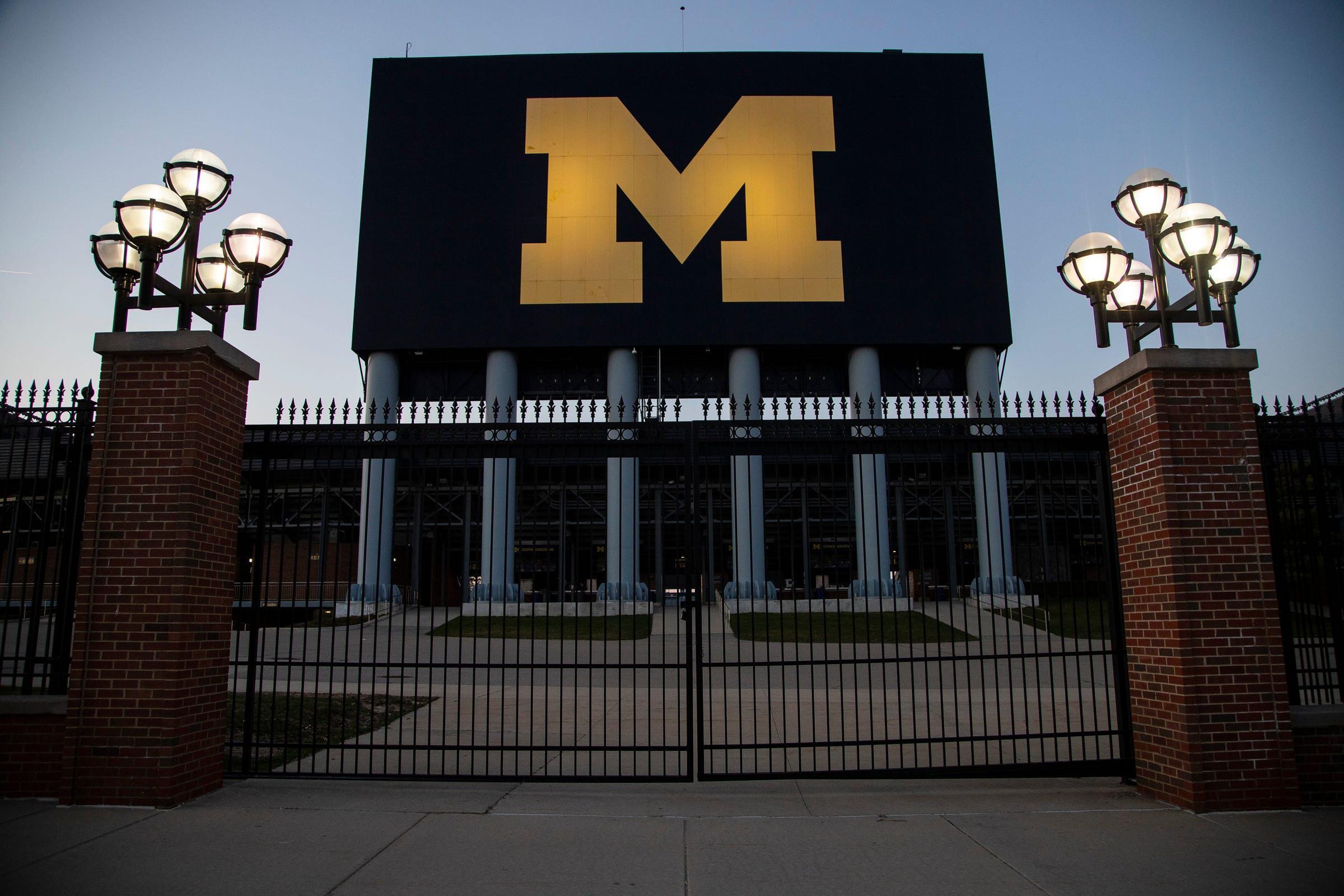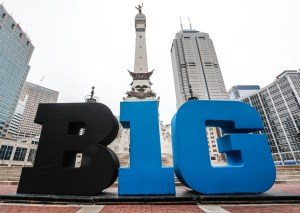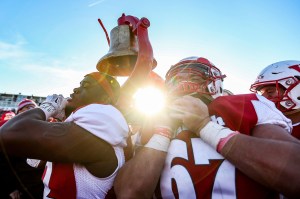Before he was laid off, David Riggs worked as Colgate University’s one-man athletics ticket sales office, handling not only “everything with regards to the box office” but also marketing and revenue-generating promotions.
But earlier this summer, Riggs lost his job due to budget cuts related to COVID-19. Colgate Athletics, a much smaller department than those of FBS schools and a member of Division I’s Patriot League, was one of many athletic departments to cut staff due to the pandemic college economy. Financial models for Division I departments vary widely, but layoffs have hit schools of all sizes and from all regions, from Colgate to the University of Michigan.
“It was certainly shocking,” Riggs said. “The whole day I was just kind of trying to figure out, well, what do I do now?”
Some experts believe the layoffs stem from weaknesses in college athletics finances that the pandemic has exacerbated, and one raised the possibility that the pandemic gave departments an opportunity to carry out restructuring plans they may have already had in mind, but couldn’t previously justify.
Since television money flooded college sports after Congress broke up the NCAA’s TV monopoly in 1984, many college athletic departments have become rife with “administrative bloating,” Victoria Jackson, a sports historian and professor at Arizona State University, said in an August interview with Front Office Sports. More than 60% of the richest Power 5 departments’ budgets went to lavish facilities and equipment, and coaching and administrative staff in 2017-18, according to data from the Knight Commission on Intercollegiate Athletics.
Jackson said the spend-what-you-make model made athletic departments particularly vulnerable to even minor economic crises, which the pandemic has magnified. From 2009 to 2018, Power 5 conference revenue rose 66%, according to Knight Commission data. Expenses followed, rising at a whopping rate of 64%.
“It is frustrating because we knew this was a bad business model, and now peoples’ actual lives and livelihoods are affected by that,” Jackson said.
For many DI athletic departments, the financial bleeding began last March, when the NCAA canceled the men’s and womens’ March Madness tournaments. The media rights to men’s March Madness alone serve as the backbone for NCAA revenue, as the governing body grosses more than $800 million from those rights. The money trickles down to all member schools, and without March Madness, the NCAA delivered $375 million less than was expected to Division I programs.
Of course, the biggest revenue loss could come from losing football this fall. One independent study estimated $4 billion in total losses among Power 5 schools if all fall football was canceled.
Conferences who have postponed football are already suffering given their anticipated losses. The University of Utah, a Power 5 program and member of the Pac-12 — the only Power 5 conference to currently not have plans to play fall football — announced it would furlough every member of its staff for a varying time period.
The Power 5 schools with the largest budgets drew 23% of revenue from ticket sales, 11% from corporate sponsorship and 31% from NCAA conference distributions, college football playoff distributions and media rights in 2017-18, according to Knight Commission data. So it’s easy to see how a loss of March Madness and football could severely stifle these programs.
Even programs that will host football this fall have implemented layoffs. The Big Ten Conference reversed its original decision to postpone football until the spring, though staffing damage has already been done. Before this reversal, Michigan expected $100 million in losses, athletic director Warde Manuel announced. While it remains unclear how much of that $100 million the program will recoup with this modified fall season — 21 staffers have already been let go.
Russell Wright, the managing director of a college athletics consulting firm called Collegiate Consulting, said that especially in the Power 5 and Group of 5 conferences, “It always seemed to me staffing was very top heavy.”
Despite the fact that University of Texas, Austin football and Texas Tech football never had plans to postpone their seasons, they’ve both implemented layoffs. Texas athletic director Chris Del Conte announced his department had eliminated 35 positions, though his program grossed the most money of any DI public program in 2018-19, according to USA TODAY. And Texas Tech announced 40 job cuts, estimating $25 million in projected losses, partially due to lack of fans in the stadium.
“I almost call it a correction … when it comes to staffing,” Wright said of the pattern of layoffs. In other words, athletic departments like Texas’ may have simply gotten too big for their britches, especially in a time of economic turmoil.
But there’s another reason lucrative programs could be laying off staff: Some schools are using the pandemic-impacted economy as an excuse to implement restructuring strategies — whether that means eliminating positions or cutting sports — that they’ve wanted to make since before the pandemic.
“I’ve heard very intelligent and business-minded people say things like, ‘You never want to squander an opportunity which a crisis could present,’” said Irwin Kishner, the co-chair of the sports law group at law firm Herrick, Feinstein, who has worked on a number of sports negotiations. “If not now, when?” Kishner added that this phenomenon is not exclusive to the college sports industry.
When presented with this possibility, Wright agreed with Kishner’s idea.
Wright said he’s now trying to advise clients, many of whom are in the process of conference or department restructuring projects he calls “not so fun,” to create a “rainy day fund” so that departments won’t be as devastated economically if another crisis arises that disrupts their revenue streams.
But it’s hard to blame athletic departments for not planning in advance for a once-in-a-century pandemic, said Kishner, who added he doesn’t believe that the business model of athletic departments is inherently precarious, given that it is built to funnel money to athletics resources.
Regardless of the exact reasons, the announcements athletic departments published of these layoffs usually included lamentations for the difficult decisions they’ve had to make, saying that after taking stock of their finances there was just no way to maintain these positions and stay afloat.
Both Kishner and Wright described what an internal process might look like to determine layoffs are necessary, saying that they would advise clients to take stock of their expenses, and look for logical areas to cut down, as well as evaluate how much revenue they might lose in order to understand how dire their circumstances. While it may be logical for employees with more lucrative salaries to take pay cuts, rather than eliminating lower-salaried positions, many coaches or athletic directors have contracts that don’t allow for an athletic department to cut salaries due to a pandemic, Kishner said.
Both said they might advise clients to consider taking out private loans, which might eliminate the need for cost cutting measures like layoffs. Wright emphasized that he would rigorously evaluate the impact of those loans on a schools’ finances and future borrowing capacity.
Some conferences have considered these loans already — the Pac-12 looked into one loan program, according to a Mercury News report, and Big 12 Commissioner Bob Bowlsby confirmed during a press conference that the Big 12 had considered, but ultimately rejected, the prospect of a loan.
As for the big picture of collegiate athletics finances, Knight Commission CEO Amy Perko told Front Office Sports in August that college sports need a “reset.” But Kishner, conversely, said athletic departments need to maintain as much normalcy in their staffing and strategy as possible, given that eventually, sports with fans will return. “This too shall pass,” he said.
As athletic departments cut down, hundreds of college sports employees look to a strange job market to figure out what to do next. For his part, Riggs said he’s scouting out new opportunities in both collegiate and professional sports, and feels like companies will realize they need his skill set in ticket sales and sports marketing as events slowly return. “It certainly hasn’t driven me out of, or shielded me away from, continuing on in college sports,” Riggs said. “I’m very passionate about working in the sports industry.”




![[Subscription Customers Only] Jun 15, 2025; Seattle, Washington, USA; Botafogo owner John Textor inside the stadium before the match during a group stage match of the 2025 FIFA Club World Cup at Lumen Field.](https://frontofficesports.com/wp-content/uploads/2026/02/USATSI_26465842_168416386_lowres-scaled.jpg?quality=100&w=1024)


![[Subscription Customers Only] Jul 13, 2025; East Rutherford, New Jersey, USA; Chelsea FC midfielder Cole Palmer (10) celebrates winning the final of the 2025 FIFA Club World Cup at MetLife Stadium](https://frontofficesports.com/wp-content/uploads/2026/02/USATSI_26636703-scaled-e1770932227605.jpg?quality=100&w=1024)











